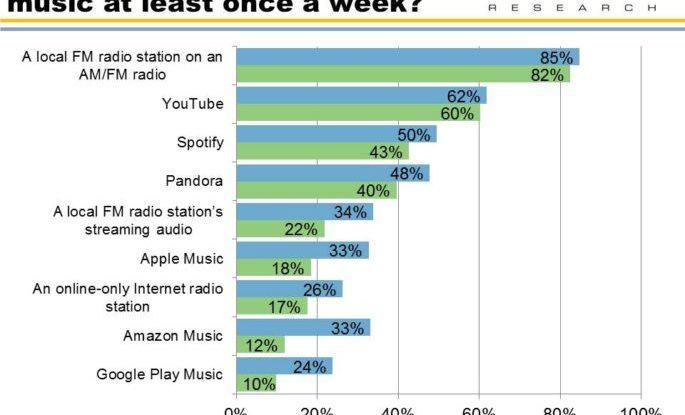
In the latest blog post from MATT BAILEY, INTEGR8 RESEARCH notes, “Our previous post revealed that the majority of 15 to 39-year-old radio listeners no longer own a radio outside of their cars. Furthermore, listeners that don’t own radios are also less likely to own an Amazon Echo or Google Home, which means they can’t use them to play radio programming. While only 14% of the 15 to 39-year-old radio listeners* we interviewed own a smart speaker today, adoption of voice-powered devices is growing rapidly. As more people welcome ALEXA, GOOGLE and soon a SIRI smart-speaker into their homes, are we correct to assume users will ask ALEXA and her AI friends to play our radio stations?
“What we found is both encouraging and challenging for radio broadcasters. Smart speaker owners are indeed more likely to listen to local FM stations’ streaming, but they also listen to a lot of on-demand audio. They’re heavy music consumers in general, using a deeper offering of services to play music compared to listeners who don’t own smart speakers. First, among the radio listeners we surveyed, smart speaker owners are also heavy radio listeners on traditional radios. 85% of smart speaker owners listen weekly to music on a traditional AM/FM radio, three percentage points higher than listeners in general.

“What about the audio services that you can actually ask ALEXA and GOOGLE to play, including local FM radio stations’ streams? Smart speaker owners are indeed more likely to listen to a local FM station’s streaming audio. Among all 15 to 39-year-olds, 22% listen to a local FM station’s streaming audio, but 34% of smart speaker owners do. They’re also more likely to use other radio-styled programming options, including PANDORA and online-only stations. These findings suggest that smart speakers are indeed well suited to the “set it and forget it” convenience of traditional radio programming, as well as the ease of verbally requesting a familiar local FM radio brand. At the same time, smart speaker owners are also more likely to listen to on-demand audio services. They use SPOTIFY more, but are also significantly more likely to use AMAZON MUSIC, GOOGLE PLAY and APPLE MUSIC.”
Read the full post here.
This Article Was Originally Posted at www.allaccess.com